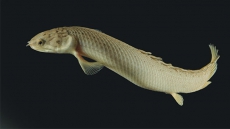ST. JOHN'S, N.L. - Diana Snow's grandfather was among hundreds of Newfoundlanders who lined up a century ago to fight in the First World War as part of a fervent bid to help Britain.
The former British colony and dominion raised the volunteer Newfoundland Regiment or First 500 without official government involvement, such was the zeal to enlist.
Those first soldiers heading to what most believed would be a months-long adventure in Europe left with their ankles wrapped in thin blue wool — not the traditional British khaki. It was a distinctive bit of kit for which they were known, and are still revered today, as the Blue Puttees.
"He had a tremendous pride in his country," Snow recalled of her grandfather, William Newell. "And his country at the time, of course, was Britain."
Newell was a single, 28-year-old stevedore with a good job working the docks in St. John's. But he didn't hesitate to sign up.
"When the call came looking for volunteers I can actually see him saying: 'I don't have to second-think that,'" Snow said. "He wanted to go serve his country and that's what he did."
Newell was not alone.
Kerri Button, curator of history for the First World War project at The Rooms museum and archives, said the response to a mid-August enlistment proclamation was "overwhelming."
It started when the Newfoundland Patriotic Association was formed at a community meeting in St. John's soon after war was declared.
"They were looking for 500 men and I think in the end, the number had reached 743 who tried to enlist by Sept. 2," Button said in an interview.
As in other parts of the British empire, there was a rush to be part of the war effort before it was all over. Few expected the war would drag on for years.
The enthusiasm would wane as casualties mounted and the horrors of trench combat hit home.
But in late summer of 1914 it was all about the desire to honour "King and country" along with collective outrage aimed at Britain's foes, Button said.
There are varying accounts of why those first Newfoundland soldiers wore blue puttees. One popular version is that the local Church Lads' Brigade offered the blue wraps because of a shortage of the standard olive fabric.
But Anne Chafe, director of the provincial museum division at The Rooms in St. John's, said its researchers have settled on a different story.
She said the colour was deliberately chosen and inspired by an elite brigade that fought in the Boer War more than a decade earlier.
"This was a conscious decision for the regiment to go with blue to distinguish them from others."
It wasn't long before the fighting Newfoundlanders made a name for themselves in battle. They were the only unit from North America to fight at Gallipoli starting in 1915.
King George V added the prefix Royal to the regiment's title in 1917, in part for its valour at in battle at Ypres and Cambrai.
But it is most renowned for the slaughter at Beaumont Hamel on July 1, 1916, when most of the regiment was killed or wounded as the Battle of the Somme opened disastrously.
"They went over the top knowing that the Germans were down below in a ravine and they were basically easy targets," Chafe said. "There were 801 men who went over the top, and 68 answered the roll call the next day."
That catastrophe is still marked each year in Newfoundland and Labrador. Every July 1 starts with memorial tributes before Canada Day celebrations begin in the afternoon.
The Rooms is honouring those sacrifices with a new exhibit of remembrance showcasing First World War artifacts and stories collected from descendants of the soldiers who fought. A unique practice gas mask, medals, notebooks, uniforms, boots, even a prosthetic leg have been donated, each with a tale passed on by the families who kept them.
Diana Snow has her own collection of military kit from the grandfather she adored.
For her, remembering is what's most important. She treasures a small New Testament that her grandfather carried with him overseas. It's inscribed from his sister, Lizzie, and dated Oct. 1, 1914, three days before the Blue Puttees sailed out of St. John's for England.
Snow often thinks of what those young soldiers went through.
"The conditions that they had to live under, the fighting that they did and the friends that they lost, the brothers they lost. We can't even imagine it," she said. "We're just living in peace, here in Newfoundland. And we're so very lucky."





